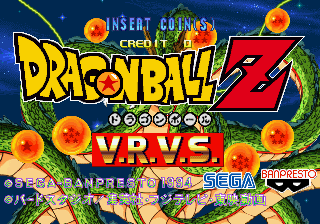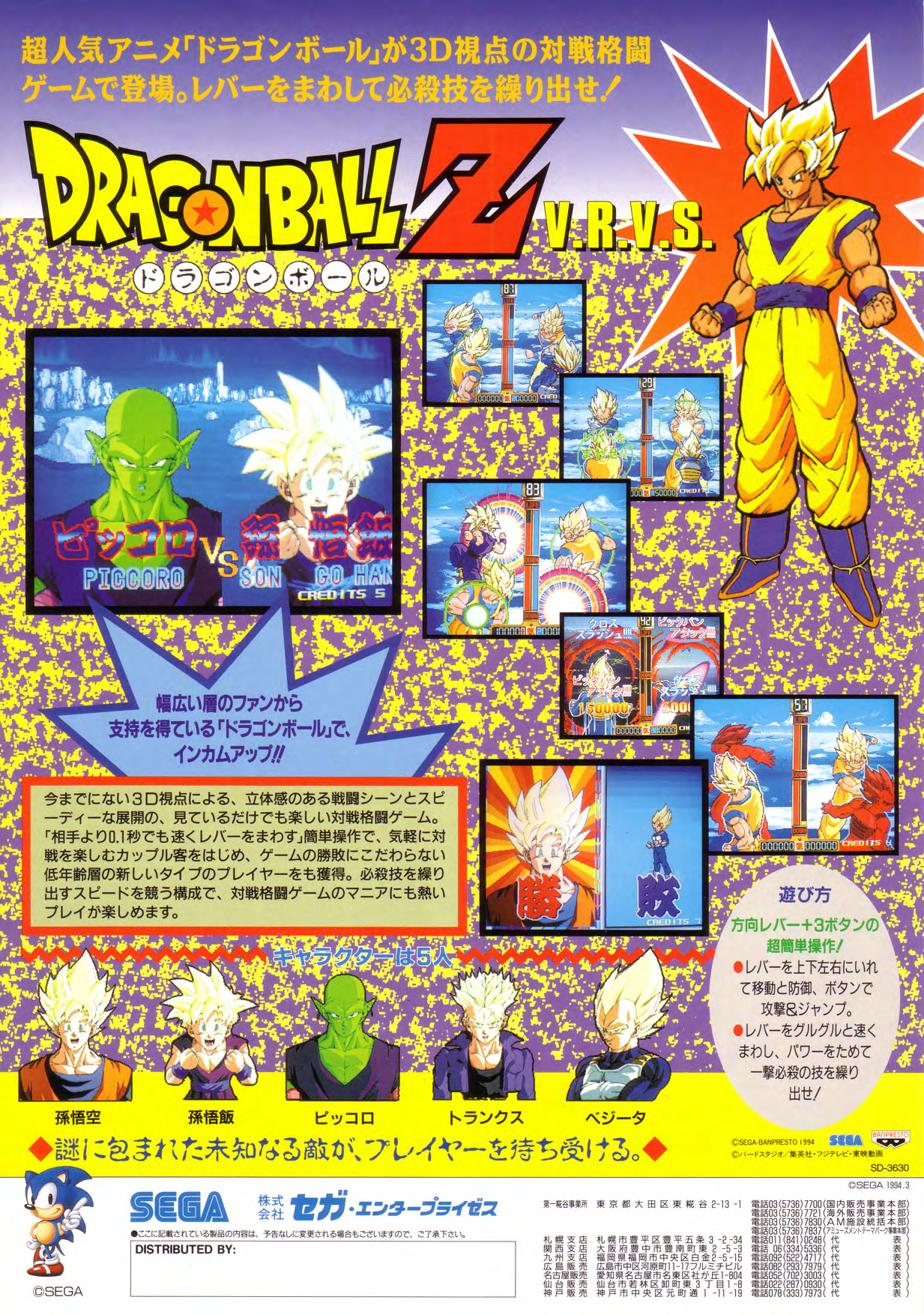Dragon Ball Z V.R.V.S.
From Sega Retro
| Dragon Ball Z V.R.V.S. | |||||||||
|---|---|---|---|---|---|---|---|---|---|
| System(s): Sega System 32 | |||||||||
| Publisher: Sega Enterprises, Ltd. | |||||||||
| Developer: Sega AM3,[1] Sega AM4, Banpresto | |||||||||
| Licensor: Bird Studio, Shueisha, Fuji TV, Toei Douga | |||||||||
| Genre: Fighting | |||||||||
| Number of players: 1-2 | |||||||||
|
This short article is in need of work. You can help Sega Retro by adding to it.
Dragon Ball Z V.R.V.S. is a third-person fighting game based on the Dragon Ball Z franchise, and was released for Sega System 32 arcade hardware exclusively in Japan. The cabinet features motion sensors, meaning it can be played by physically punching and kicking in a similar manner to the Sega Activator. The project was originally conceived to be a 4-player game at Joypolis[2], then using the title Dragon Ball Z VR Battle.[3]
Contents
Gameplay
Although the game uses 2D sprites, it uses third-person, over-the-shoulder camera angles positioned behind the characters along with sprite scaling to create a 3D-like experience. The game is controlled with a joystick and 3 buttons, while a deluxe edition of the game features motion sensors that allow the player to move his or her body to control the character in the game.
The technology used was similar to that of the Sega Activator peripheral for the Mega Drive console, but with extra sensors to pull off better reaction sensing. This was thus the first successful example of full-body motion sensing in a video game.
Playable characters
- Son Goku
- Piccolo
- Vegeta
- Son Gohan
- Trunks
History
Reception
The game was well-received upon its original debut at the Amusement Machine Show 1993. It was praised for its accurate motion detection and fun gameplay, and was popular with the crowd at the show.[4][5]
Legacy
A modified version of Dragon Ball Z V.R.V.S. was at one point set for release on the 3DO as Dragon Ball Z: Cell to Kogeki Da[6]; however, the project was ultimately scrapped. It is unknown if Sega had any involvement in this conversion. Sega Logistics Service announced it would end service on Dragon Ball Z V.R.V.S. machines on March 31, 2017.[7][8]
Production credits
- Main article: Dragon Ball Z V.R.V.S./Production credits.
Magazine articles
- Main article: Dragon Ball Z V.R.V.S./Magazine articles.
Promotional material
Photo gallery
Physical scans
| System 32, JP | ||||
|---|---|---|---|---|
References
- ↑ 1.0 1.1 Sega Arcade History, Enterbrain, page 131
- ↑ @Hiro_H10th on Twitter
- ↑ Harmony, "1993 9-10" (JP; 1993-10-01), page 5
- ↑ Edge, "November 1993" (UK; 1993-09-30), page 17
- ↑ Electronic Gaming Monthly, "October 1993" (US; 1993-xx-xx), page 222
- ↑ https://www.kamisama.com.br/3do-dragon-ball-z-cell-to-kogeki-da/
- ↑ File:SegaProductsTerminationAnnouncement 2016-11 JP.pdf
- ↑ File:SegaProductsTerminationAnnouncement 2016-12.pdf
| Dragon Ball Z games for Sega systems | |
|---|---|
| Dragon Ball Z V.R.V.S. (1994) | |
| Dragon Ball Z: Buyuu Retsuden (1994) | |
| Dragon Ball Z: Shinbutouden (1995) | Dragon Ball Z Idainaru Dragon Ball Densetsu (1996) | |
| Unlicensed Dragon Ball Z games for Sega systems | |
| Dragon Ball: Final Bout (1998) | |



